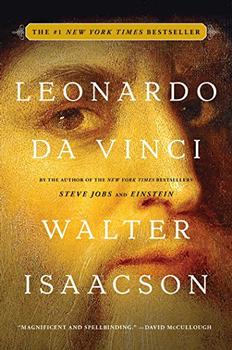Summary | Excerpt | Reviews | Beyond the Book | Readalikes | Genres & Themes | Author Bio

Critics' Opinion:
Readers' Opinion:
First Published:
Oct 2017, 624 pages
Paperback:
Oct 2018, 576 pages
 Book Reviewed by:
Book Reviewed by:
Rose Rankin
Buy This Book
Because Florence's guild of notaries barred those who were non legittimo, Leonardo was able to benefit from the note-taking instincts that were ingrained in his family heritage while being free to pursue his own creative passions. This was fortunate. He would have made a poor notary: he got bored and distracted too easily, especially when a project became routine rather than creative.
DISCIPLE OF EXPERIENCE
Another upside for Leonardo of being born out of wedlock was that he was not sent to one of the "Latin schools" that taught the classics and humanities to well-groomed aspiring professionals and merchants of the early Renaissance. Other than a little training in commercial math at what was known as an "abacus school," Leonardo was mainly self-taught. He often seemed defensive about being an "unlettered man," as he dubbed himself with some irony. But he also took pride that his lack of formal schooling led him to be a disciple of experience and experiment. "Leonardo da Vinci, disscepolo della sperientia," he once signed himself. This freethinking attitude saved him from being an acolyte of traditional thinking. In his notebooks he unleashed a blast at what he called the pompous fools who would disparage him for this:
I am fully aware that my not being a man of letters may cause certain presumptuous people to think that they may with reason blame me, alleging that I am a man without learning. Foolish folk!... They strut about puffed up and pompous, decked out and adorned not with their own labors, but by those of others.... They will say that because I have no book learning I cannot properly express what I desire to describe—but they do not know that my subjects require experience rather than the words of others.
Thus was Leonardo spared from being trained to accept dusty Scholasticism or the medieval dogmas that had accumulated in the centuries since the decline of classical science and original thinking. His lack of reverence for authority and his willingness to challenge received wisdom would lead him to craft an empirical approach for understanding nature that foreshadowed the scientific method developed more than a century later by Bacon and Galileo. His method was rooted in experiment, curiosity, and the ability to marvel at phenomena that the rest of us rarely pause to ponder after we've outgrown our wonder years.
To that was added an intense desire and ability to observe the wonders of nature. He pushed himself to perceive shapes and shadows with wondrous precision. He was particularly good at apprehending movement, from the motions of a flapping wing to the emotions flickering across a face. On this foundation he built experiments, some conducted in his mind, others with drawings, and a few with physical objects. "First I shall do some experiments before I proceed further," he announced, "because my intention is to consult experience first and then with reasoning show why such experience is bound to operate in such a way."
It was a good time for a child with such ambitions and talents to be born. In 1452 Johannes Gutenberg had just opened his publishing house, and soon others were using his moveable-type press to print books that would empower unschooled but brilliant people like Leonardo. Italy was beginning a rare forty-year period during which it was not wracked by wars among its city-states. Literacy, numeracy, and income were rising dramatically as power shifted from titled landowners to urban merchants and bankers, who benefited from advances in law, accounting, credit, and insurance. The Ottoman Turks were about to capture Constantinople, unleashing on Italy a migration of fleeing scholars with bundles of manuscripts containing the ancient wisdom of Euclid, Ptolemy, Plato, and Aristotle. Born within a year of Leonardo were Christopher Columbus and Amerigo Vespucci, who would lead an era of exploration. And Florence, with its booming merchant class of status-seeking patrons, had become the cradle of Renaissance art and humanism.
Excerpted from Leonardo da Vinci by Walter Isaacson. Copyright © 2017 by Walter Isaacson. Excerpted by permission of Simon & Schuster. All rights reserved. No part of this excerpt may be reproduced or reprinted without permission in writing from the publisher.





The House on Biscayne Bay
by Chanel Cleeton
As death stalks a gothic mansion in Miami, the lives of two women intertwine as the past and present collide.

The Flower Sisters
by Michelle Collins Anderson
From the new Fannie Flagg of the Ozarks, a richly-woven story of family, forgiveness, and reinvention.

The Funeral Cryer by Wenyan Lu
Debut novelist Wenyan Lu brings us this witty yet profound story about one woman's midlife reawakening in contemporary rural China.
Your guide toexceptional books
BookBrowse seeks out and recommends the best in contemporary fiction and nonfiction—books that not only engage and entertain but also deepen our understanding of ourselves and the world around us.